
P.S. Know someone who would make a great Survivor Leadership Program Manager for the NSN? Forward them this job posting: castla.applicantpro.com/jobs/3442619
26.07.2024 20:17 — 👍 3 🔁 1 💬 0 📌 0@nsn.bsky.social
National Survivor Network: A community of survivors of #humantrafficking. We create a platform for survivor led advocacy, peer-to-peer mentorship & empowerment. https://linktr.ee/nationalsurvivornetwork

P.S. Know someone who would make a great Survivor Leadership Program Manager for the NSN? Forward them this job posting: castla.applicantpro.com/jobs/3442619
26.07.2024 20:17 — 👍 3 🔁 1 💬 0 📌 0
From Chris: When I came to this position, I hoped to lay a solid foundation for both the network and whoever steps into management after me, and what an impactful foundation we’ve laid! This fall, I am leaving my current position at the NSN to pursue other opportunities. I look forward to continued membership as a member of the NSN and future collaborations as a partner in this work. Read more in our most recent stakeholder newsletter (link in bio)
"When I came to this position, I hoped to lay a solid foundation for the network & whoever steps into management after me, & what an impactful foundation we’ve laid! This fall, I’ll will leave my current position at the NSN to pursue other opportunities." www.icontact-archive.com/archive?c=18...
26.07.2024 20:16 — 👍 5 🔁 0 💬 1 📌 0
So what can we do? Ensure that any survivor storytelling is not just “ethical” but is also “survivor-driven” - INITIATED BY the survivor. Ensure genuinely informed consent about what to expect before, during, and after the engagement. Provide (but do not mandate) supports, such as a check in after the engagement or an advocate present for it. Sign up for the NSN’s newsletter at our website to be updated when our evidence-informed trainings for survivors launch!
Full analysis is forthcoming, but we are sharing initial results so that anyone hoping to improve their survivor storytelling practices can draw upon the collective wisdom and experiences of our respondents.
View the report of preliminary findings at nationalsurvivornetwork.org/document/sto...
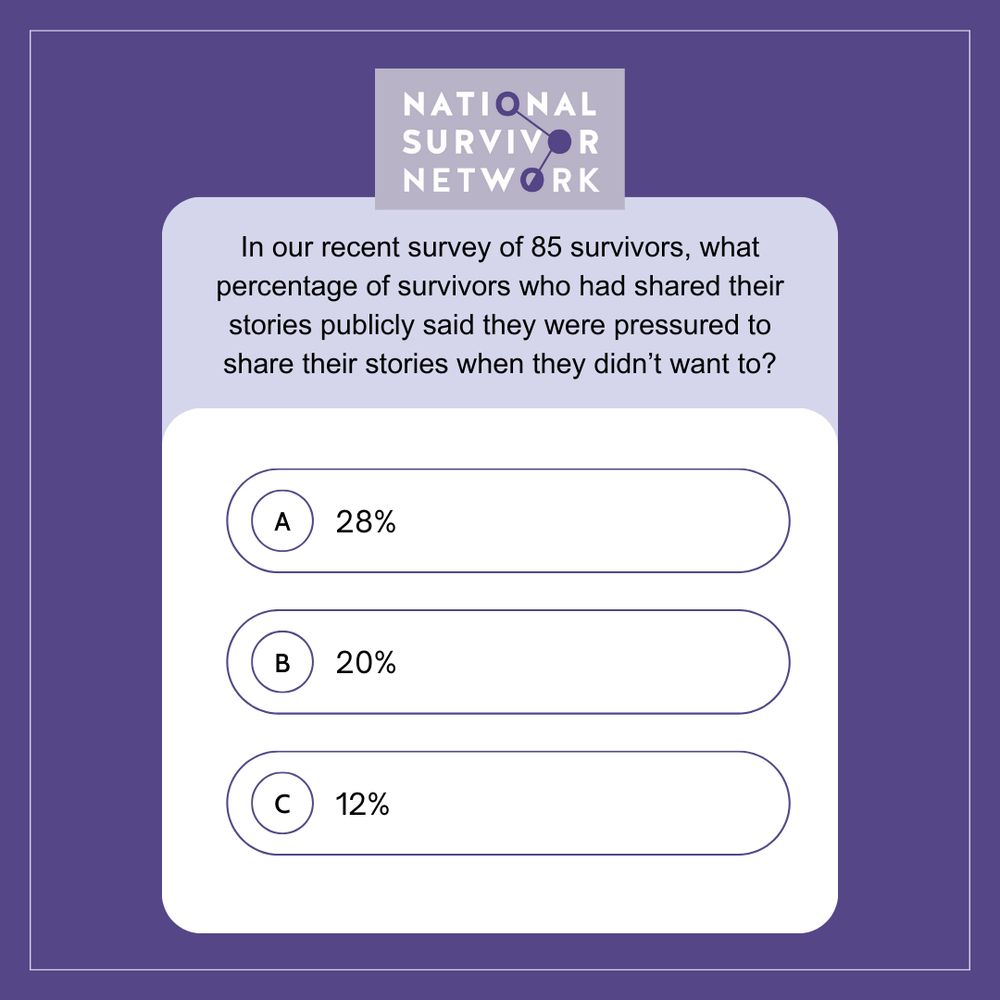
In our recent survey of 85 survivors, what percentage of survivors who had shared their stories publicly said they were pressured to share their stories when they didn’t want to? 28%, 20%, or 12%?

20% of the survey respondents who had shared their stories publicly at least one time reported that they were pressured to do so. In fact, 29% of those who’d shared their stories indicated that they were not excited to share their stories in the first place, but did so for other reasons. Check out our report of preliminary findings on our survey of trafficking survivors about their experiences of sharing their stories publicly at nationalsurvivornetwork.org/storytelling (link in bio)

In our recent survey of 85 survivors, which of the following types of backlash had survivors experienced after sharing their stories publicly? Revictimization and PTSD which made them unable to work or pay their bills. Engagements “dried up” after they stopped sharing trauma narratives in public speaking. Being treated differently in the workplace and in other professional engagements.

All of the above! Respondents also reported being doxxed and harassed online or having their traffickers call the news channel after a story aired. Check out our report of preliminary findings on our survey of trafficking survivors about their experiences of sharing their stories publicly at nationalsurvivornetwork.org/storytelling (link in bio)
2 of 3. View the report of preliminary findings in a survey of 85 survivors about their storytelling experiences here: nationalsurvivornetwork.org/document/sto...
07.06.2024 12:07 — 👍 1 🔁 0 💬 0 📌 0
In our recent survey of 85 survivors, what percentage of survivors who had shared their stories publicly said they were pressured to share details they’d wanted to keep private? 42%, 33%, or 21%?

33% of the survey respondents who had shared their stories publicly at least one time reported that they were willing to share their stories but were pressured to share details they’d wanted to keep private. Check out our report of preliminary findings on our survey of trafficking survivors about their experiences of sharing their stories publicly at nationalsurvivornetwork.org/storytelling (link in bio)

In our recent survey of 85 survivors, what percentage of survivors who had shared their stories publicly said their stories had been misrepresented? 30%, 23%, or 16%?

30% of the survey respondents who had shared their stories publicly at least one time reported that their stories had been misrepresented. Check out our report of preliminary findings on our survey of trafficking survivors about their experiences of sharing their stories publicly at nationalsurvivornetwork.org/storytelling (link in bio)
In preparation for developing an evidence-informed training for survivors hoping to share their stories publicly, the NSN surveyed 85 survivors under IRB approval from the University of North Carolina at Chapel Hill. View the preliminary findings here: nationalsurvivornetwork.org/document/sto...
07.06.2024 12:01 — 👍 1 🔁 1 💬 2 📌 0
Computer shows a fundraiser titled "Support Azadi Survivor Leaders Affected by the Floods." Caption reads Donate to support our sister organization's survivor leaders as they recover from devastating flooding.
Donate here to support safety for survivor leaders in Kenya impacted by devastating flooding: www.mchanga.africa/fundraiser/9...
13.05.2024 21:04 — 👍 2 🔁 0 💬 0 📌 0
MEMBER REMINDERS:
1) Newsletter was sent out this week - check your emails!
2) Our monthly meeting is this Sunday. We'll have a brief presentation on how automation can support your work.
3) Yesterday we sent out a time-sensitive email with a vote for a policy decision - vote by Monday!

COLLECTIVE POWER: “The anti-trafficking sector’s unique history means that its mainstream frameworks around healing, services, support, and recovery are not rooted in collective power-building.”
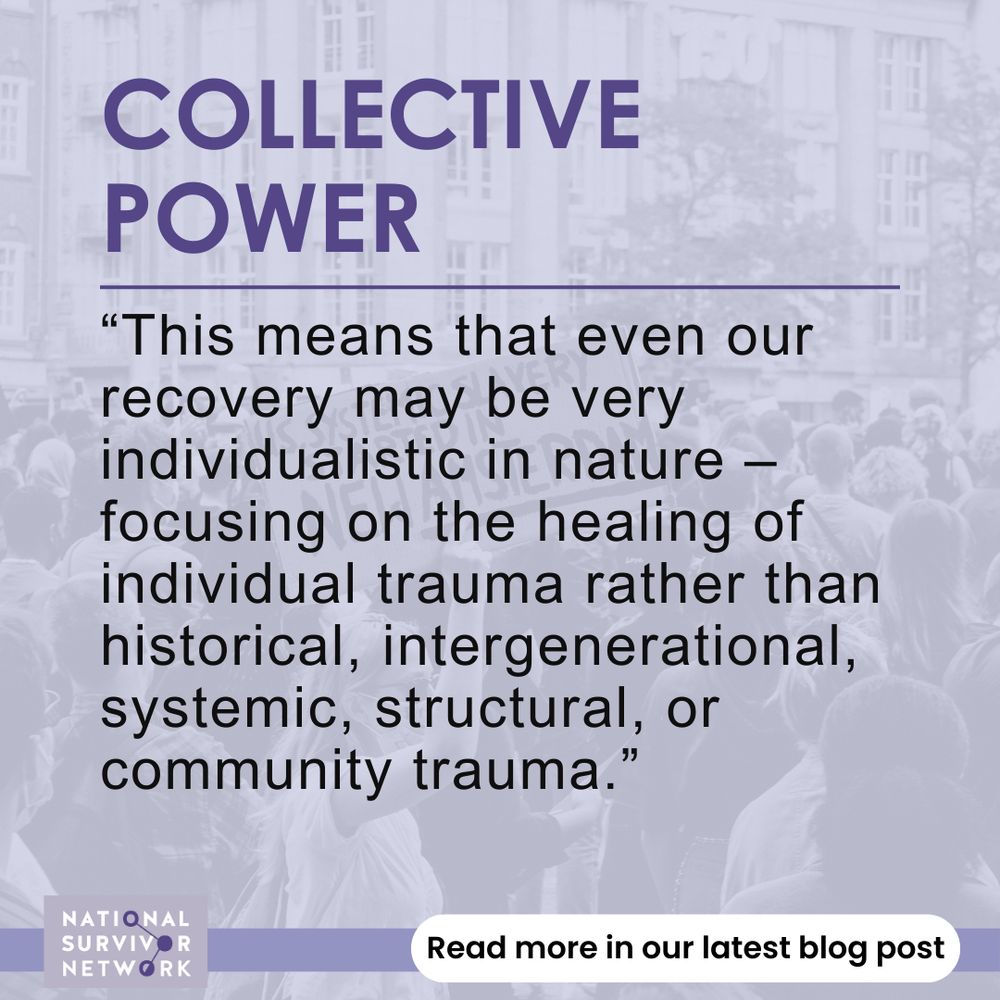
“This means that even our recovery may be very individualistic in nature – focusing on the healing of individual trauma rather than historical, intergenerational, systemic, structural, or community trauma.”

“It may focus on individual healing as the end goal, rather than the transformation of harmful conditions.”
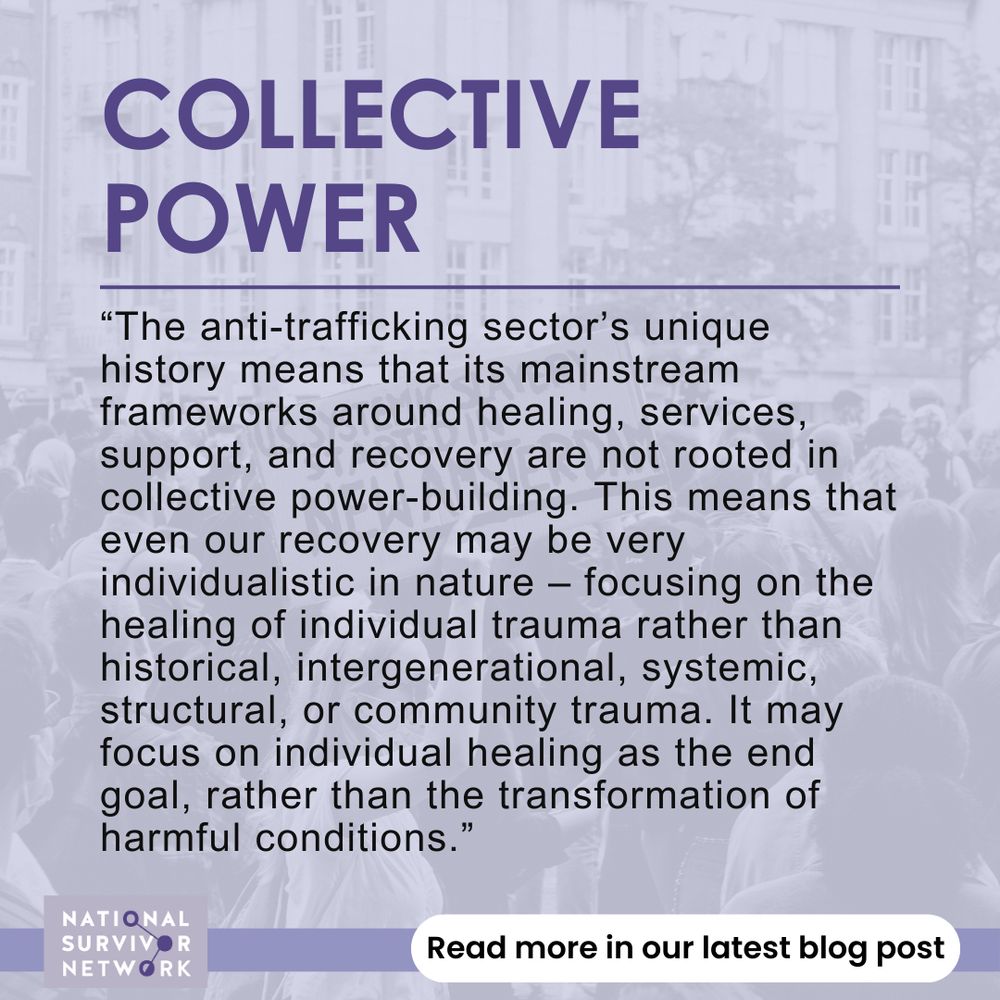
COLLECTIVE POWER: “The anti-trafficking sector’s unique history means that its mainstream frameworks around healing, services, support, and recovery are not rooted in collective power-building. This means that even our recovery may be very individualistic in nature – focusing on the healing of individual trauma rather than historical, intergenerational, systemic, structural, or community trauma. It may focus on individual healing as the end goal, rather than the transformation of harmful conditions.” Read more in our latest blog post
Collective power doesn't mean more survivors hold power-over in positions of authority.
Learn more in our latest blog post, which is the first in a series. nationalsurvivornetwork.org/collectivepo... #CollectivePower #CollectiveAction #MeaningfulEngagement
While this level of engagement can be ideal, it may not be ideal for every project. For example, we would only want a team of people with lived experience developing a protocol for assessing a medical patient for a traumatic brain injury if they also have healthcare knowledge, training, and skills.
18.04.2024 17:47 — 👍 1 🔁 0 💬 0 📌 0
1) The Lived Experience Engagement Spectrum levels are: Inform, Ask, Involve, Collaborate, and Empower. This post is about the Empower level. From Meaningful Engagement of People with Lived Experience: a framework and assessment for measuring and increasing lived experience leadership across the spectrum of engagement

2)Doing well at the "Empower" level of the lived experience engagement spectrum means that people with lived experience have final decision-making power over policies, programming, research, and implementation. Your organization or program will implement the strategies and decisions impacted people develop. While this level of engagement can be ideal, it may not be ideal for every project.

3) Examples of Empower: Examples of Empower: Hire staff with lived experience in a meaningful percentage of managerial, executive, leadership and decision-making positions. Ensure that project and program teams will be led by people with lived experience, including for decision-making and budgetary concerns. Select individuals for their skills rather than their trauma and support them well in their leadership development. This level is most appropriate when an organization has made meaningful progress on racial equity, non-discrimination, and trauma-informed organizational practice.
At the "empower" level, people with lived experience have final decision-making power over policies, programming, research, and implementation. Your organization or program will implement the strategies and decisions impacted people develop. Learn more at nationalsurvivornetwork.org/meaningfulen....
18.04.2024 17:46 — 👍 1 🔁 0 💬 1 📌 0
1) The Lived Experience Engagement Spectrum levels are: Inform, Ask, Involve, Collaborate, and Empower. This post is about the Collaborate level. From Meaningful Engagement of People with Lived Experience: a framework and assessment for measuring and increasing lived experience leadership across the spectrum of engagement

2)Doing well at the "collaborate" level of the lived experience engagement spectrum within an organization would mean impacted people are well represented among your employees or regular contractors. At a programmatic, community, or regional level, it means that your organization collaborates with partner organizations or initiatives that are led by people with lived experience and that have a high level of meaningful lived experience engagement.

3) Examples of Collaborate: Examples of Collaborate: Employ people with lived experience on staff or as regular contractors doing programmatic, policy, or research work, without expecting or requiring them to share their stories or to be defined by their trauma. Develop and implement internal lived experience leadership equity initiatives. Assess your organization for equitable access, upward mobility, compensation, and job satisfaction among staff with lived experience, compared to other staff. Conduct equity analyses of your staff with lived experience compared to the populations you serve.
At the collaborate level, survivors aren't just consultants or advisors - they're full partners on every part of the work from planning to implementation through evaluation. Learn more: nationalsurvivornetwork.org/meaningfulen...
17.04.2024 17:02 — 👍 1 🔁 0 💬 0 📌 0
Survivors’ stories should not be exploited by others for political or economic gain. View our sign-on letter here:
On March 7, 2024, Senator Britt delivered the Republican response to the SOTU. In her remarks, Senator Britt expressed fears of violence by undocumented immigrants & misappropriated a trafficking survivor’s story.
View our full letter: nationalsurvivornetwork.org/document/sur...
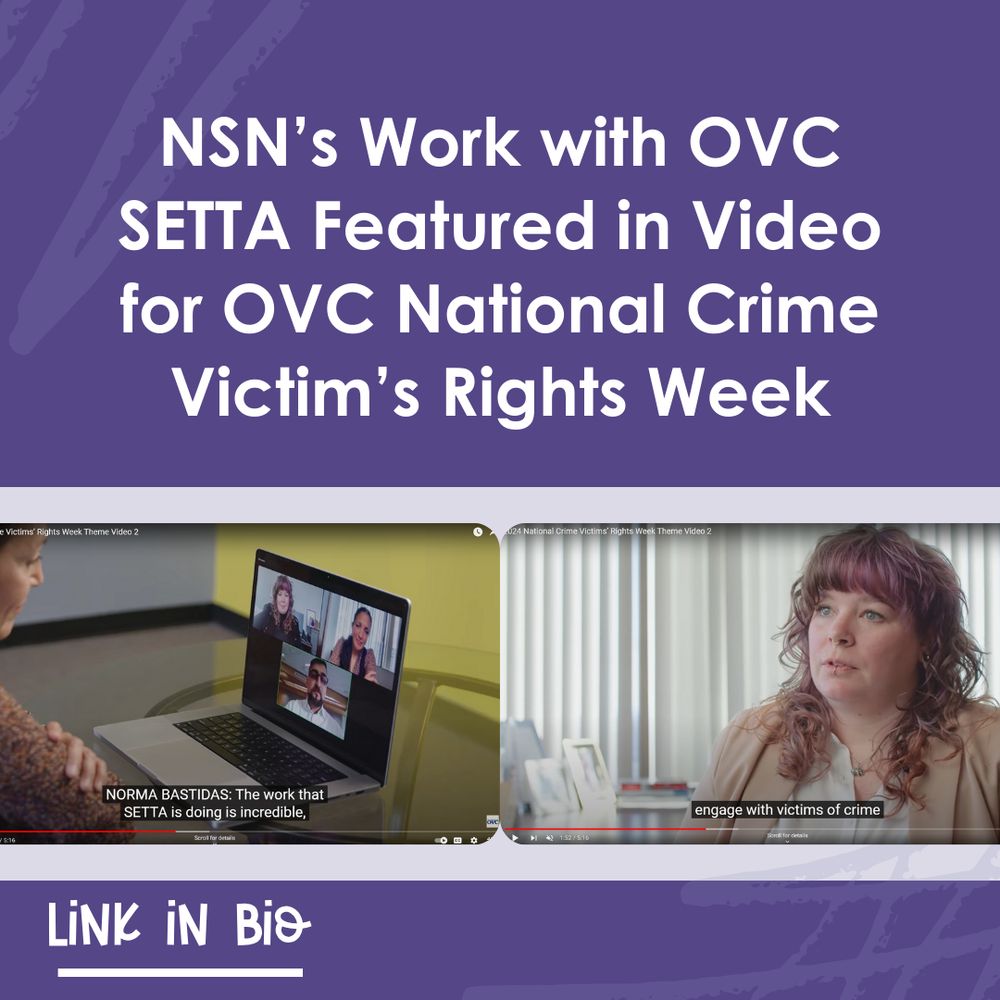
Image shows two screenshots that feature NSN members Rebekah Layton and Norma Bastidas from the video. Text reads: NSN’s Work with OVC SETTA Featured in Video for OVC National Crime Victim’s Rights Week
In this OVC video, NSN SETTA Consultant Norma Bastidas and NSN SETTA Coordinator Rebekah Layton did an incredible job speaking to why we value meaningful engagement, and why it is essential to a functioning response to trafficking.
View the video here: www.youtube.com/watch?v=fv7b...

The "involve" level gives organizations a chance to access survivor brilliance and insights throughout the course of a project.
Learn more about the Lived Experience Engagement Spectrum and find tools to help you evaluate your progress at nationalsurvivornetwork.org/meaningfulen...
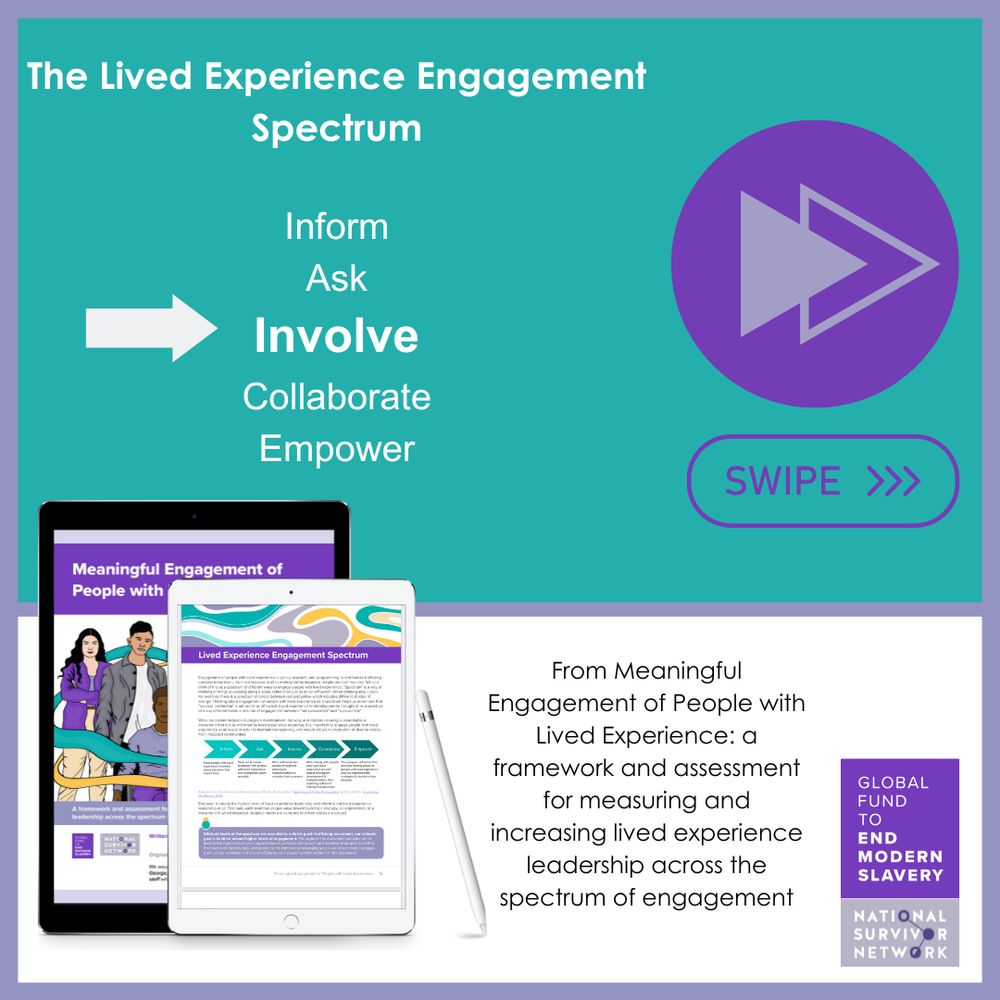
1) The Lived Experience Engagement Spectrum levels are: Inform, Ask, Involve, Collaborate, and Empower. This post is about the Involve level. From Meaningful Engagement of People with Lived Experience: a framework and assessment for measuring and increasing lived experience leadership across the spectrum of engagement

2)Doing well at the "involve" level of the lived experience engagement spectrum means that people with lived experience are engaged throughout planning and implementation to consider their concerns and ensure the incorporation of their feedback.

3) Examples of Involve: Conduct focus groups of people with lived experience regarding their needs, experiences of services, and insights before beginning project or program planning. Hire consultants with lived experience or consultant review teams that are project or program-specific and have ongoing input throughout planning and implementation. Establish paid lived experience advisory councils to provide ongoing guidance to organizational leadership. These may be impacted individuals who do not have the capacity, time, or skillset to serve on Boards or as staff, but who have insight that could shape your programs.
After ask, the next level of the meaningful engagement spectrum is "involve." Many survivors may want to be more engaged than simply replying to a survey. Some may have invaluable insights, skills, and knowledge that can improve your program or project.
27.03.2024 20:31 — 👍 1 🔁 1 💬 1 📌 0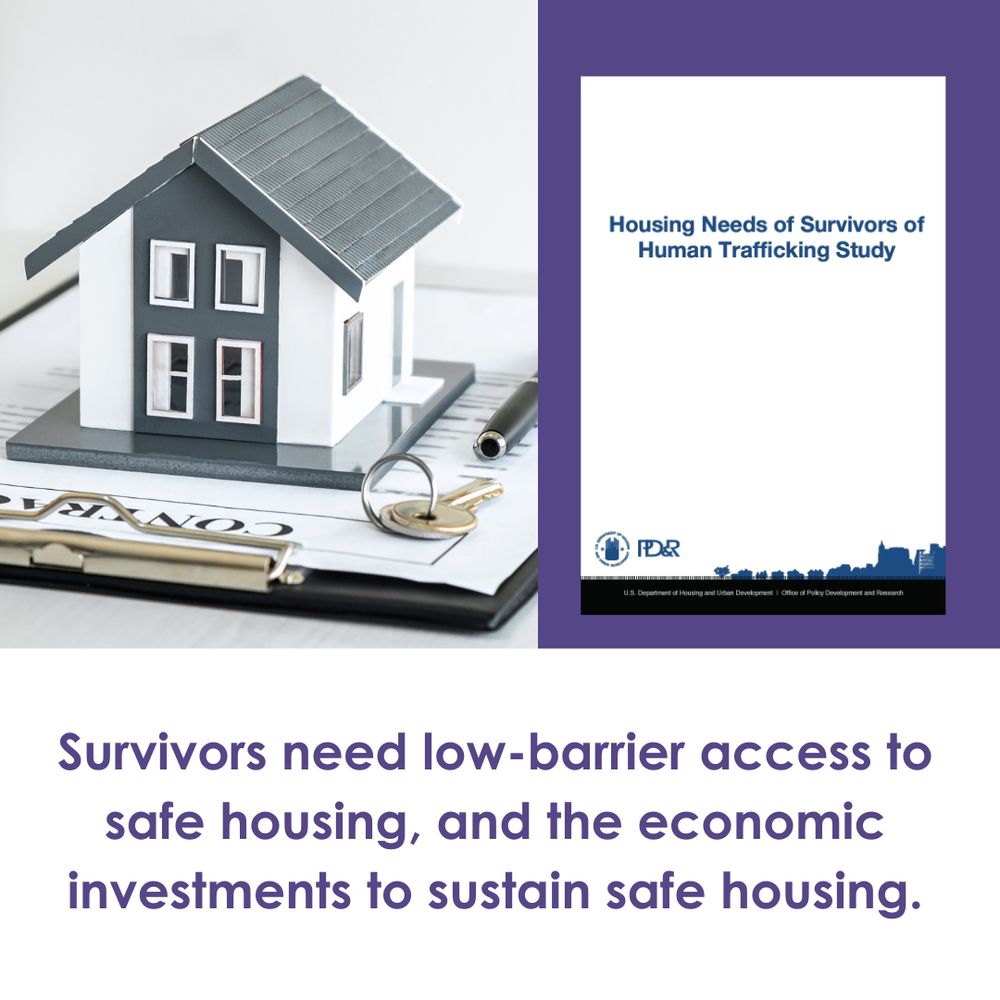
Image of a house next to a report cover that says "Housing Needs of Survivors of Human Trafficking Study". Text reads "survivors need low-barrier access to safe housing, and the economic investments to sustain safe housing.

Image of a house next to a report cover that says "Housing Needs of Survivors of Human Trafficking Study". Text reads "The NSN was proud to partner with Freedom Network USA and the US Department of Housing and Urban Development on this study of the housing needs of trafficking survivors."
Survivors have known it for a long time, and now we have research to back it up: Current models of housing and shelter are not meeting the short or long-term needs of trafficking survivors. View this research report from HUD at www.huduser.gov/portal/porta...
26.03.2024 20:27 — 👍 1 🔁 1 💬 2 📌 2
Learn more about the Lived Experience Engagement Spectrum and find tools to help you evaluate your progress at: nationalsurvivornetwork.org/meaningfulen...
25.03.2024 13:43 — 👍 0 🔁 0 💬 0 📌 0
1) The Lived Experience Engagement Spectrum levels are: Inform, Ask, Involve, Collaborate, and Empower. This post is about the Ask level. From Meaningful Engagement of People with Lived Experience: a framework and assessment for measuring and increasing lived experience leadership across the spectrum of engagement

2) Doing well at the "ask" level of the lived experience engagement spectrum means that we intentionally seek out and review lived experience feedback and incorporate it when possible. While many organizations may bring on consultants with lived experience to provide review and feedback of projects in-progress or being implemented, an often overlooked but essential way te seek out crucial feedback is through meaningful and ethical engagement with your current clients. Have a plan in place for soliciting, receiving, and acting on critical feedback so that you can continually improve your work.

3) Examples of Ask: Consistently survey people with lived experience in your client base, consultants, and staff about their experiences with those engagements. Conduct focus groups of current clients, contractors, or staff with lived experience regarding their experiences with your organization. Compensate people with lived experience to review and provide feedback into existing documents, plans, policies, or programs. While some engagement at this level may be uncompensated, surveys that take longer than 5-10 minutes, focus groups, and document review should always be compensated.
While it's great to get outside information at the consult level, it's essential to make sure you're providing regular opportunities for current clients, staff, and consultants to provide feedback on whether what you're doing is meeting their needs, & to LISTEN, LEARN, & ACT.
25.03.2024 13:43 — 👍 0 🔁 0 💬 1 📌 0
“When advocates aren't morally opposed to an industry, like agriculture, they work to make the industry and all workers safer and listen to those working in that industry.” - Re-Centering Sex Worker Safety in Anti-Trafficking Work: Perspectives from the Field.
Anti-trafficking organizations must apply the same human rights values to public policy in the sex trades as in other sectors: listen to sex workers and advocate for a safer workplace for all. nationalsurvivornetwork.org/document/rec...
22.03.2024 17:52 — 👍 6 🔁 5 💬 0 📌 0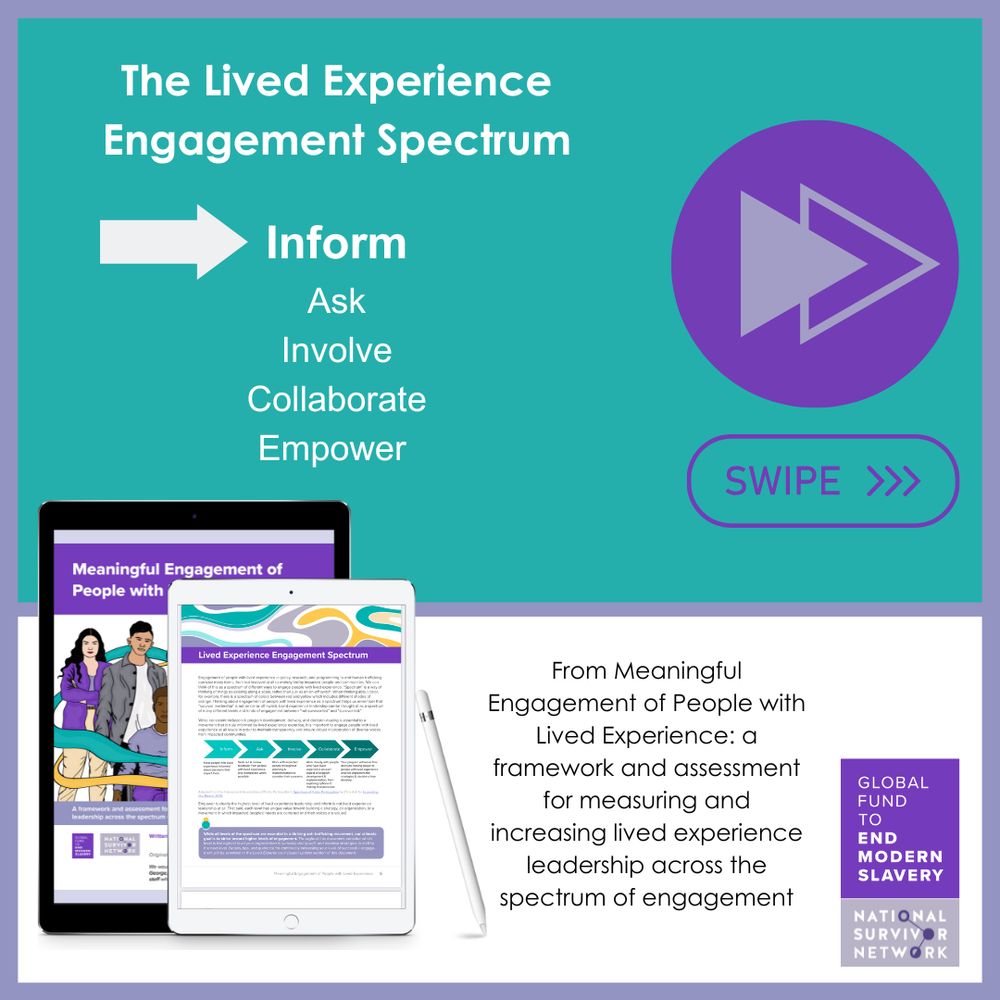
1) The Lived Experience Engagement Spectrum levels are: Inform, Ask, Involve, Collaborate, and Empower. This post is about the inform level. From Meaningful Engagement of People with Lived Experience: a framework and assessment for measuring and increasing lived experience leadership across the spectrum of engagement

2) Doing well at the “inform” level of the lived experience engagement spectrum means that we keep impacted people informed about the decisions that affect them. While this level is not lived experience “leadership,” it lays the foundation for leadership through transparency (which is part of a trauma-informed approach) and respecting survivors’ dignity.

3) Examples of “Inform”:Ensure that fact sheets, newsletters, and websites are in plain language, disability-accessible, and language accessible. Ensure that safeguarding and grievance policies are easy-to-find and clear. Provide transparency in advance about how lived experience feedback is used and incorporated. Develop and implement feedback loops to follow up and inform impacted individuals of actions taken after complaints or progress on projects they contributed to. Create an engaging and plain-language impact report.;
The Lived Experience Engagement Spectrum levels are: Inform, Ask, Involve, Collaborate, and Empower. Read the full Meaningful Engagement of People with Lived Experience framework and assessment here: nationalsurvivornetwork.org/meaningfulen...
22.03.2024 13:21 — 👍 0 🔁 0 💬 0 📌 0
Denial of access to basic services when biased anti-trafficking narratives encourage funders to divest from community-based models of support for people in the sex trades.
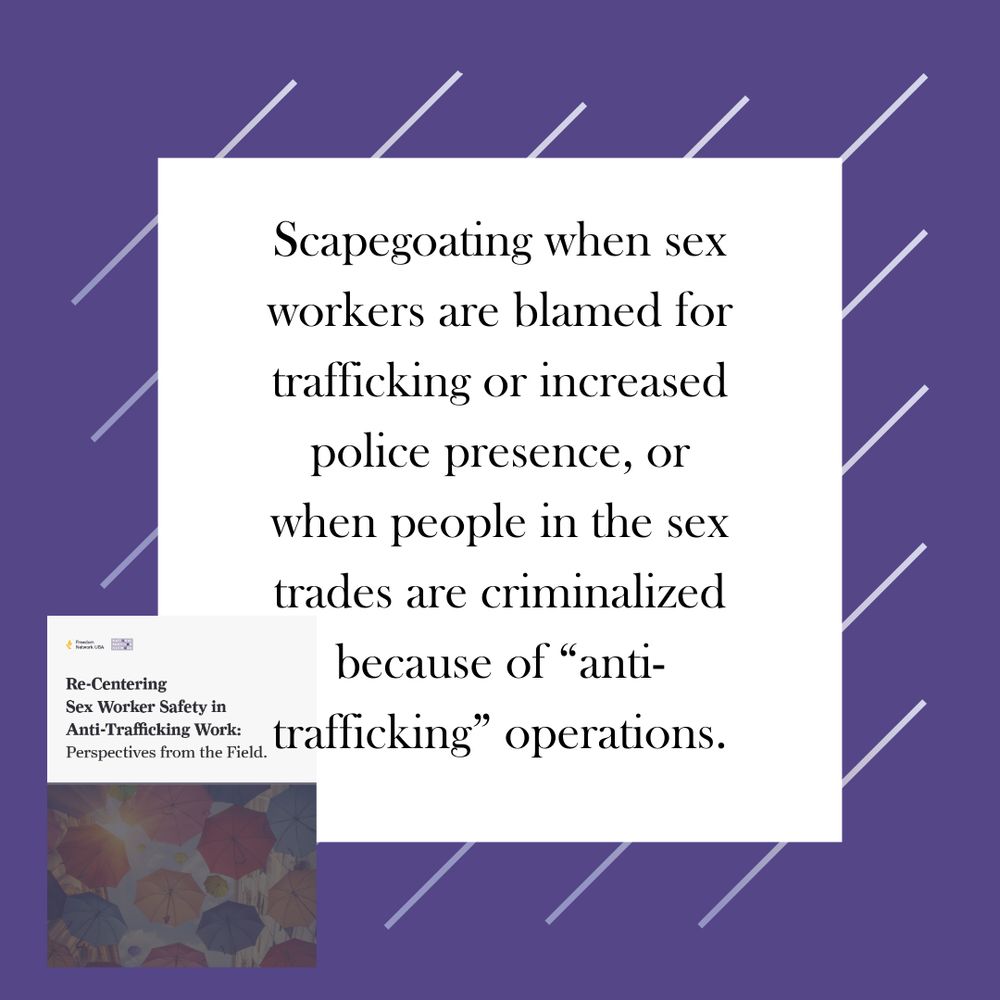
Scapegoating when sex workers are blamed for trafficking or increased police presence, or when people in the sex trades are criminalized because of “anti-trafficking” operations.

Learn more about how unchecked harm in the name of “anti-trafficking” decreases the safety and stability of people in the sex trades. Re-Centering Sex Worker Safety in Anti-Trafficking Work: Perspectives from the Field is available in the NSN's resource library on our website.
Our co-published document with Freedom Network USA offers guidance on how to approach anti-trafficking work with an intention of not causing harm to sex workers. Learn more: nationalsurvivornetwork.org/document/rec...
19.03.2024 13:49 — 👍 1 🔁 1 💬 0 📌 1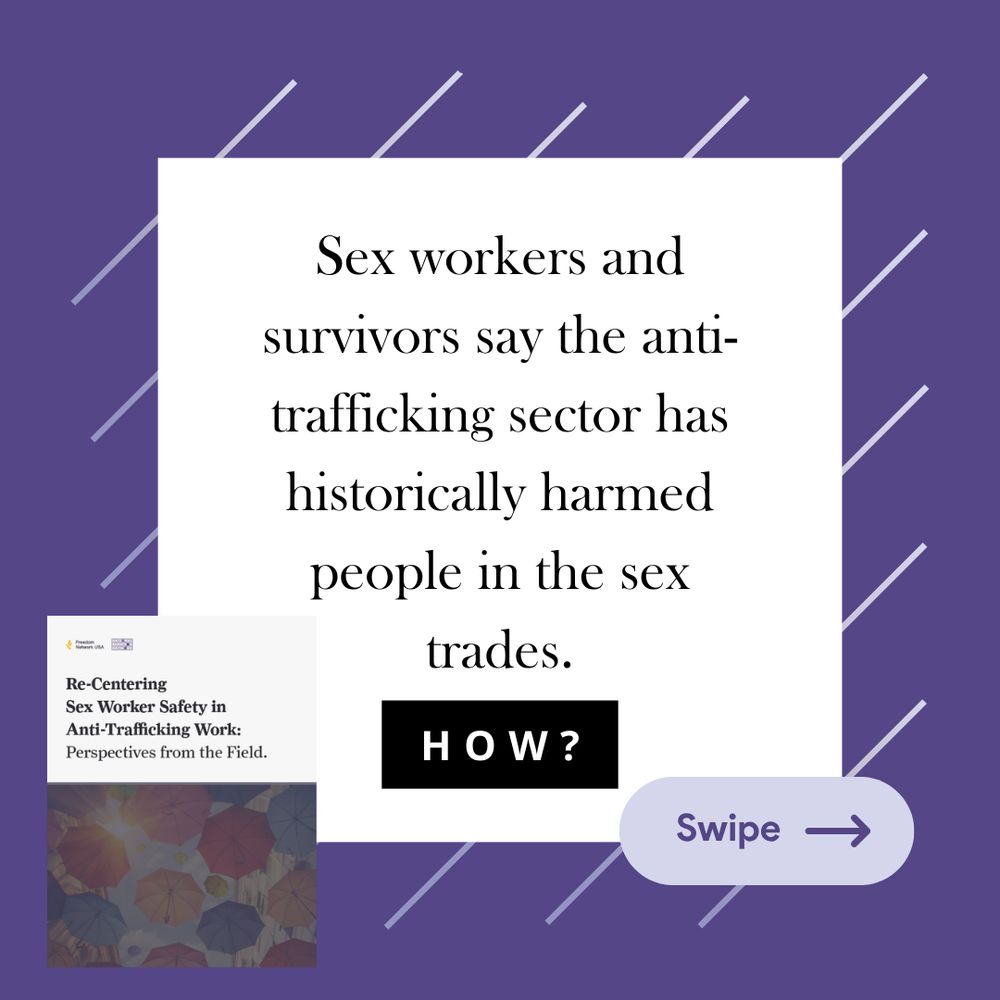
Sex workers and survivors say the anti-trafficking sector has historically harmed people in the sex trades. How? (Swipe)

Decreased safety at the hands of police conducting anti-trafficking operations and under laws limiting adults’ access to financial options and online platforms.

Harassment and personal attacks by anti-trafficking advocates, including racial, homophobic, and transphobic slurs, defamation, and stalking.

Erasure or dismissed experiences that don’t fit the mainstream HT narrative, forcing or gaslighting people with lived experience out of anti-trafficking spaces.
We cannot cause harm to end harm. Learn more at: nationalsurvivornetwork.org/document/rec...
19.03.2024 13:46 — 👍 1 🔁 0 💬 1 📌 0
NSN joins 26 other organizations in asking the Department of Homeland Security to finalize its T-Visa Regulations On March 7, 2024, the NSN and other organizations sent a letter to Secretary of Homeland Security, Alejandro Mayorkas, asking for the finalization of needed improvements to T-Visa rules and regulations. View the full letter in the resource library of our website.
On March 7, 2024, the NSN and other organizations sent a letter to the Secretary of Homeland Security, asking for the finalization of needed improvements to T-Visa rules and regulations. View the full letter in the resource library of our website.
nationalsurvivornetwork.org/document/let...
Bluetooth trackers can easily be hidden in purses, on cars, and in plenty of other places. Knowing where and how to find them is critical. And here, we’ll show you how.
16.03.2024 02:14 — 👍 113 🔁 61 💬 2 📌 4
Focusing on a Sustainable Foundation: The 2023 Report of the National Survivor Network

In , the NSN paid survivors $29,559.90 in emergency microgrants, $28,613.27 in professional development, educational, and business microgrants; $56,294.90 in contract payment. That's a total of $114,468.07 directly into survivors pockets. Survivor leaders are highly vulnerable to re-exploitation by organizations. Cash in survivors' pockets helps them rebuild their lives and grow in leadership. Donate to support our work.

Our Equity Matrix ensures that the direct cash aid we offer is focused on those with the least access to privilege, who face multiple intersections of oppression outside of their trafficking survivorship. Who got our emergency microgrant and professional/ educational microgrants in 2022-2023? 71% identified as Black, Indigenous, Asian, or Latine; 87% identified as LGBTQ with 23% identifying as transgender; 74% indicated having a physical disability or being blind, deaf, or hard of hearing; 58% have experienced labor trafficking outside of commercial sex; 71% have been unsheltered homeless in the past 5 years.
Survivor leaders cannot provide meaningful leadership free from the pressures of economic crisis if they cannot access emergency support to meet their basic needs.
Donate: form-renderer-app.donorperfect.io/give/coaliti...
Annual Report: nationalsurvivornetwork.org/wp-content/u...
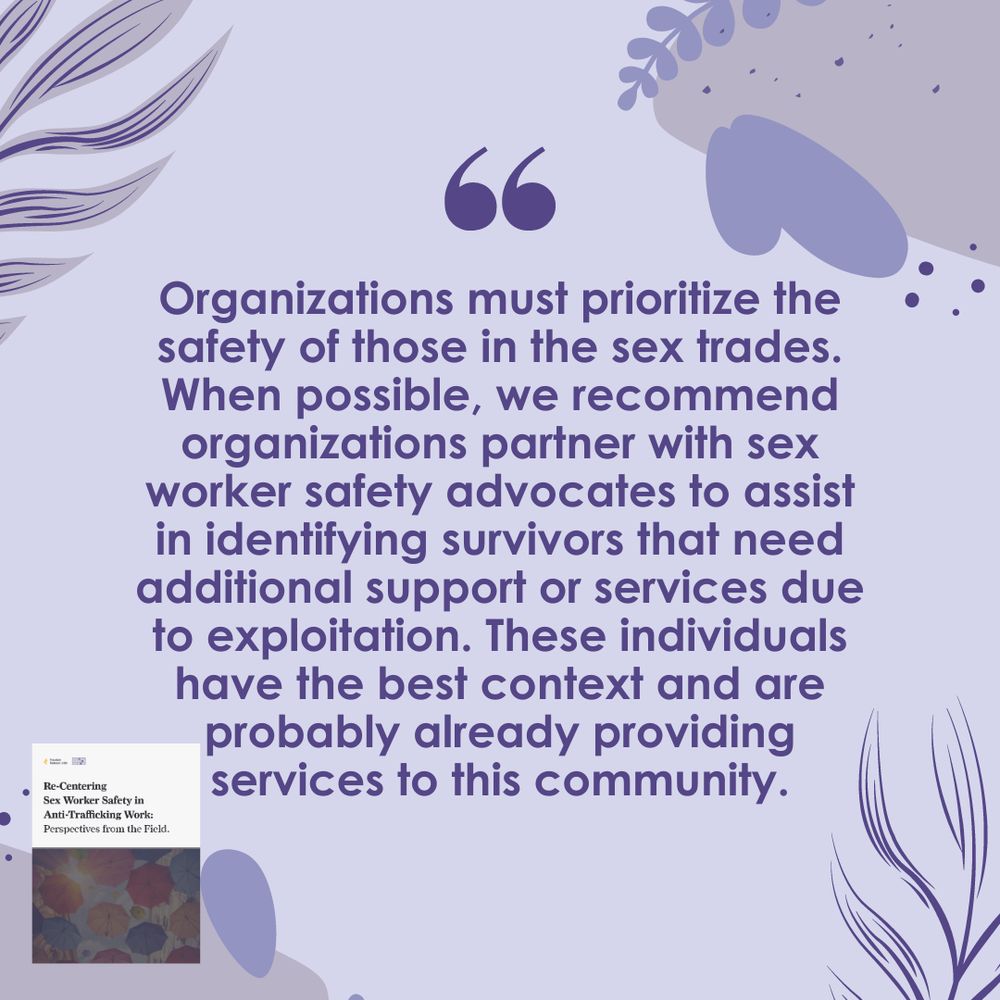
"If agencies work in a less-populated area that does not have formal sex worker safety organizations, consider reaching out to organizations that focus on other forms of harm reduction. Because of existing relationships within the drug user health community and the nature of their work, these professionals may be better positioned to reach survivors than anti-trafficking providers and may even have informal sex worker harm reduction resources that are not publicly available." - Re-Centering Sex Worker Safety in Anti-Trafficking Work

"Some services they may already provide include: Providing condoms, providing other sexual health supplies, providing food, providing housing, providing medical care, syringe exchanges, providing narcan, overdose prevention education, circulating safety info like abusive client lists" - Re-Centering Sex Worker Safety in Anti-Trafficking Work

"If agencies work in a less-populated area that does not have formal sex worker safety organizations, consider reaching out to organizations that focus on other forms of harm reduction. Because of existing relationships within the drug user health community and the nature of their work, these professionals may be better positioned to reach survivors than anti-trafficking providers and may even have informal sex worker harm reduction resources that are not publicly available." - Re-Centering Sex Worker Safety in Anti-Trafficking Work

Learn more in our joint publication with Freedom Network USA, available in the resource library of our website: Re-Centering Sex Worker Safety in Anti-Trafficking Work
Organizations must prioritize the safety of those in the sex trades. Learn more in our joint publication with Freedom Network USA, available in the resource library of our website: Re-Centering Sex Worker Safety in Anti-Trafficking Work: nationalsurvivornetwork.org/document/rec...
07.03.2024 19:41 — 👍 0 🔁 0 💬 0 📌 0
Training can focus instead on: - Identifying barriers to survivors accessing resources. - Engaging and incorporating a diverse range of survivor expertise. - Increasing specialized training to build skills and awareness for partners. - Building community relationships and increasing service options for victim safety. Ask yourself: “How am I framing the most current context of trafficking?”

Slide shows three screenshots from a section of practical guidance and language to help you make the shift to more compassionate, effective, victim-centered care. Old framework includes questions like "Have you ever had sex in exchange for food or shelter? Does an employer control your wages, housing, or transportation? New Framework asks questions like: How have you been caring for yourself when you're hungry or need somewhere to stay? Do you understand your rights as a worker? Would you like me to explain them? The Response Enhancement is: Ensure basic needs are met. Provide information on worker and/or victim rights and identify resources.
The resource includes pages of practical guidance and language to help you make the shift from red flags to real life. Check it out at nationalsurvivornetwork.org/document/red...
07.03.2024 00:24 — 👍 0 🔁 2 💬 0 📌 0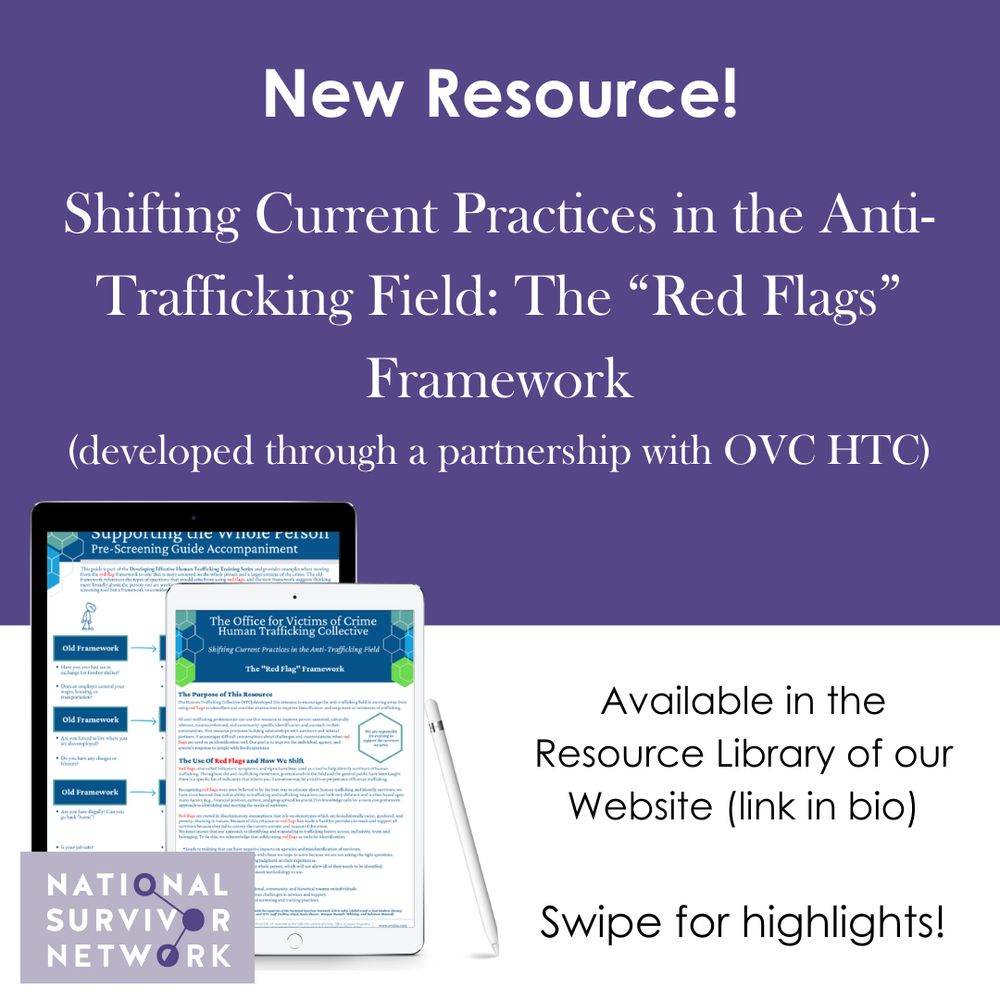
New Resource: Shifting Current Practices in the Anti-Trafficking Field: The "Red Flags" Framework (developed through a partnership with OVC HTC). Available in the resource library of our website (link in bio). Swipe for highlights!
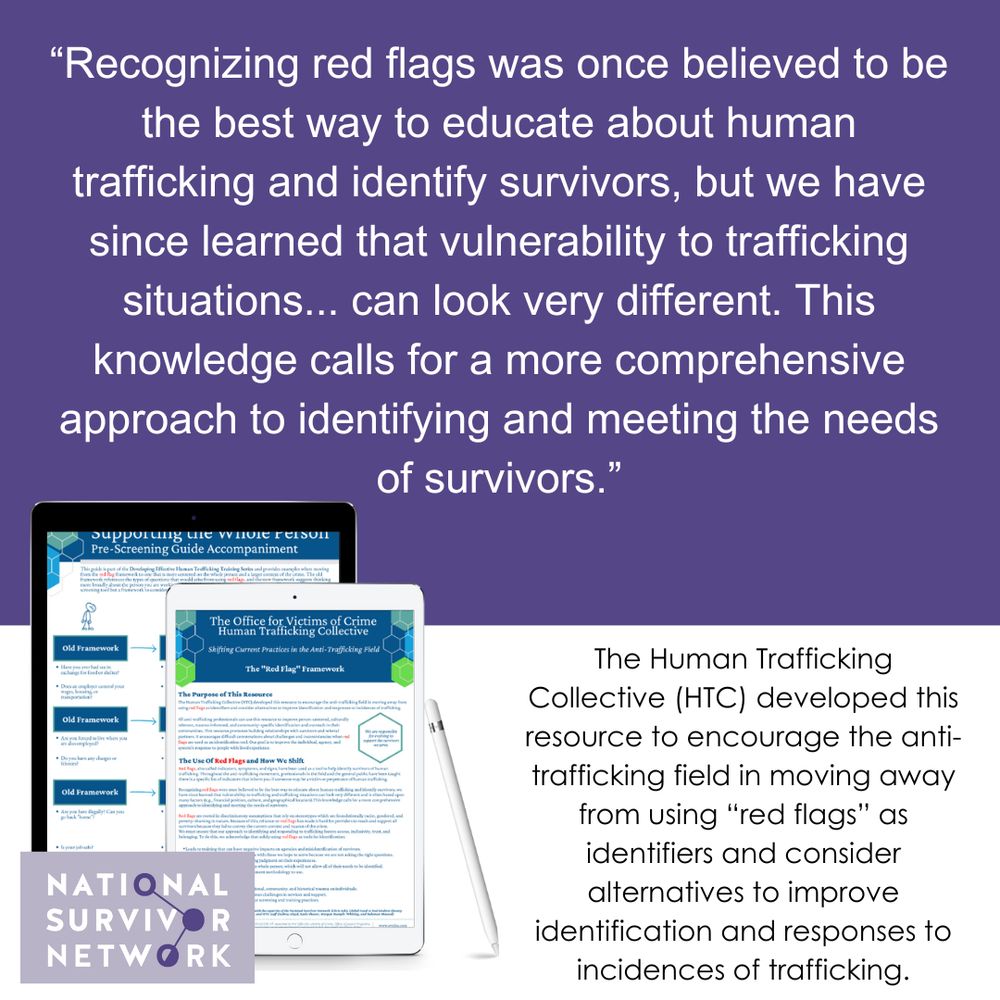

Solely using red flags: - Leads to training that can have negative impacts and misidentification of survivors. - Fails to build intentional relationships with those we hope to serve. - Sees people as a checklist rather than a whole person. - Is not an adequate screening or assessment methodology to use. Red flags are rooted in discriminatory assumptions that rely on stereotypes which are foundationally racist, gendered, and poverty-shaming in nature.
We're excited to finally be able to share a new resource from the OVC HTC that we were honored to partner on. Check out the resource library of our website to see the full resource! nationalsurvivornetwork.org/document/red...
07.03.2024 00:23 — 👍 1 🔁 2 💬 2 📌 1
Building trust and partnership with sex workers Do: Align your work with harm reduction principles Do: take the time to learn the history of sex worker rights movements Do: hire sex workers to develop trainings and education materials and pay them fairly for their labor, time, and expertise Don’t: try to convince sex workers that Law ENFORCEMENT you work with are the exception by making statements like, "oh, we work with good cops". Don’t: make leaving the sex industry (or an expecTation to Later) a PREREQUISITE to partnership Don’t: engage under false pretenses such as pretending to be a potential client
When engaging the sex worker community in partnership, it’s crucial to understand how to engage respectfully.
For more insights like these check out our new guidebook created in partnership with Freedom Network USA. View it here: nationalsurvivornetwork.org/sexworkersaf...

NSN submits feedback to United Nations Special Rapporteur on Violence Against Women and Girls about violence and commercial sex.

Nobody should ever be paying for sexual access to children. Full stop. For adults, we must speak about meaningful consent if we are to honor survivors’ agency and autonomy. Suggesting that experiencing prior trauma (particularly sexual trauma) makes someone unable to consent to commercial sex implies that survivors of prior trauma can no longer make informed choices about their own bodies and sexuality, ever.

We believe that human trafficking and other forms of exploitation occur when rights are denied, which means that the way to end trafficking and exploitation is to ensure that people have rights, including adult sex workers.
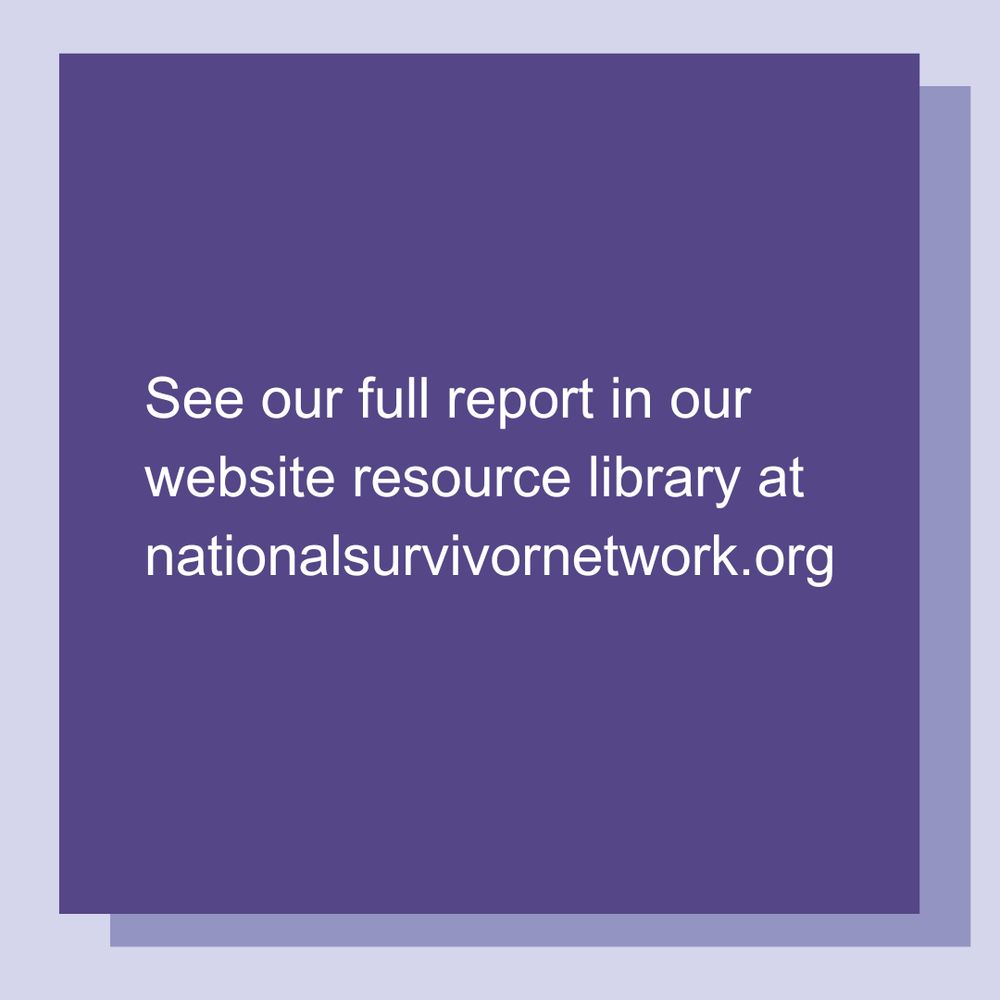
See our full report in our website resource library at nationalsurvivornetwork.org
The National Survivor Network provided input for the UN Special Rapporteur on Violence Against Women and Girls’ call for feedback about violence and commercial sex. View our full report at nationalsurvivornetwork.org/wp-content/u...
26.02.2024 18:12 — 👍 3 🔁 3 💬 0 📌 0